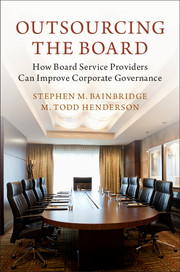Retirement Guardrails
How Proactive Fiduciaries Can Improve Plan Outcomes
$110.00 (F)
- Authors:
- Ian Ayres, Yale University, Connecticut
- Quinn Curtis, University of Virginia
- Date Published: June 2023
- availability: Available
- format: Hardback
- isbn: 9781316518632
$
110.00
(F)
Hardback
Other available formats:
Paperback, eBook
Looking for an examination copy?
If you are interested in the title for your course we can consider offering an examination copy. To register your interest please contact [email protected] providing details of the course you are teaching.
-
Scores of lawsuits have pushed retirement plan sponsors to shorter, easier-to-navigate menus, but – as Ian Ayres and Quinn Curtis argue in this work – we've only scratched the surface of retirement plan design. Using participant-level plan data and straightforward tests, Ayres and Curtis show how plan sponsors can monitor plans for likely allocation mistakes and adapt menus to encourage success. Beginning with an overview of the problem of high costs and the first empirical evidence on retirement plan fee lawsuits, they offer an overview of the current plan landscape. They then show, based on reforms to a real plan, how streamlining menus, eliminating pitfalls, and adopting static and dynamic limits on participant allocations to certain risky assets or 'guardrails' can reduce mistakes and lead to better retirement outcomes. Focusing on plausible, easy-to-implement interventions, Retirement Guardrails shows that fiduciaries need not be limited to screening out funds but can design menus to actively promote good choices.
Read more- Offers a new approach to retirement menu design
- Provides numerous straightforward and explicit ways to monitor participant choice
- Uses real participant level data to form an analysis of restricted retirement menu design
Reviews & endorsements
‘A masterpiece of meticulous and exhaustive research … an insightfully informative, thoughtful, thought-provoking, and highly recommended contribution to personal, professional, college, and university library Contemporary Economics and Money/Finance Studies collections and supplemental curriculum studies lists.’ James A. Cox, Midwest Book Review
Customer reviews
Not yet reviewed
Be the first to review
Review was not posted due to profanity
×Product details
- Date Published: June 2023
- format: Hardback
- isbn: 9781316518632
- length: 180 pages
- dimensions: 235 x 158 x 18 mm
- weight: 0.46kg
- availability: Available
Table of Contents
Introduction
1. The case for proactive fiduciaries
2. Fees and dominated funds
3. Of lawsuits and letters
4. What more fiduciaries should learn: Assessing the prevalence of allocation errors
5. What more fiduciaries should learn: Assessing whether participants portfolios perform poorly
6. What fiduciaries can do to remedy menu misuse: Different ways to implement streamlining and guardrailing
7. How should fiduciaries trade-off divergent participant interests?
8. Can streamlining and guardrailing mitigate allocation error?
9. The growing misuse of brokerage windows
Conclusion
Index.
Sorry, this resource is locked
Please register or sign in to request access. If you are having problems accessing these resources please email [email protected]
Register Sign in» Proceed
You are now leaving the Cambridge University Press website. Your eBook purchase and download will be completed by our partner www.ebooks.com. Please see the permission section of the www.ebooks.com catalogue page for details of the print & copy limits on our eBooks.
Continue ×Are you sure you want to delete your account?
This cannot be undone.
Thank you for your feedback which will help us improve our service.
If you requested a response, we will make sure to get back to you shortly.
×





